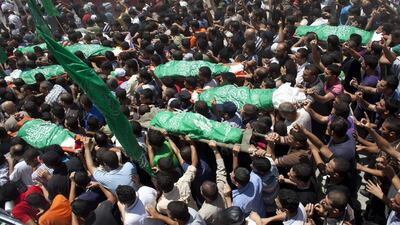KHAN YOUNIS, GAZA // When he went to bed, Tawfiq Al Halaby’s wife, Nidaa, was five-months pregnant and his neighbours, the Hajjs, were still a family.
A few hours later, an Israeli attack pulverised the Hajj home next door, flinging body parts of their children across the street.
The explosions also caused Nidaa, 28, to miscarry.
Even for a people used to the consequences of Israel’s bombs, Mr Al Halaby, 34, and Palestinians living in the area struggled to describe what may be the bloodiest massacre during three days of air strikes on Gaza.
“There were body parts everywhere,” Mr Al Halaby said in front of the mangled beams and shattered cinder blocks that used to form the Hajj family’s house.
“I found the daughter’s head in the rubble around my home. The little boy’s arm was on my doorstep.”
Six children were killed when the three Israeli strikes smashed into the house in Khan Younis early on Thursday, according to residents. Their father Mahmoud Al Hajj, a tailor in his 50s, was also killed, as was his wife.
Israeli leaders say the aerial assault on Gaza is an effort to stop scores of rockets fired by militants from the Hamas-controlled territory. Those rockets have reached as far north as Haifa in Israel forcing many to seek safety in air raid shelters.
So far, no Israelis have been killed.
The Hajj family home provided little protection from Israel’s missiles.
The eight family members were among the 33 Palestinians killed yesterday. More than 80 have been killed since Israel’s Operation Protective Edge started on Tuesday. Most have been civilian victims of attacks targeting Palestinian militants.
According to witnesses, the Hajj family were innocent victims of an Israeli military that seems to have accepted the collateral damage that comes when its formidable firepower is turned on an impoverished and tiny strip of land that is among the most densely populated places in the world.
Mohammed Qannan, 25, was watching Argentina play The Netherlands on Wednesday night along with about 15 others at the beachside Fun Time cafe near Khan Younis when it was attacked by barrages of artillery and at least three airstrikes, witnesses said.
By the time Abdul Rahman Qannan arrived at the scene, the body of Mohammed, his cousin, was being put into an ambulance. At least six people were killed in that attack, including Mohammed’s brother, Ibrahim, who was 28. On Thursday morning, authorities were still trying to find the body of one man thought to be buried in a massive crater that one of the missiles bored into the sand.
“They were inseparable,” said Abdul Rahman, 19, referring to Mohammed and Ibrahim.
“They did everything together. They worked together. They relaxed together. When people saw them, they thought that they were best friends, not brothers.”
It was tragically fitting that they died together, Abdul Rahman said. It was also tragic that on the day he was killed, Mohammed, a fisherman, had also lost in internal elections held in Khan Younis by Fatah.
The faction that controls the West Bank renewed its troubled reconciliation accord last month with Hamas, forming an interim government last month that many Palestinians hope will end a bitter feud between the two parties. That feud erupted into fighting in 2007 that ended with Hamas wresting control over Gaza from Fatah.
Mohammed was a proponent of Hamas-Fatah unity, Abdul Rahman said.
“He understood that Palestinians can’t stand up to Israel while divided,” he said of Mohammed.
But Hamas-Fatah unity may also be lifeless, as the factions fail to unite over the fighting with Israel that many fear will be drawn-out and bloody.
Not unlike Israel’s three-week bombardment of the territory that began in December 2008 and killed as many as 1,400 Palestinians. Or another one in November 2012 in which 180 Palestinians died.
Nineteen Israelis were killed in those two conflicts.
Back near what was the Hajj household, Mr Halaby, who used to work for the Fatah-run Palestinian Authority government in Gaza before the Hamas takeover, hoped for reconciliation.
That, he said, could help stop the Israeli attacks that shredded the lives of his neighbours. Or which broke mother’s neck and his father’s right shoulder and also sent a dozen other family members staying at his home to the hospital with shrapnel injuries.
“These people were just civilians. They weren’t fighting anyone. They were parents and children,” he said. “But even if there are resistance fighters here, does that mean their children also deserve to die?”
hnaylor@thenational.ae

